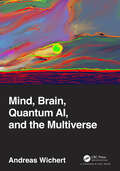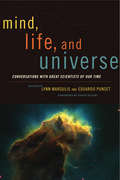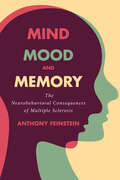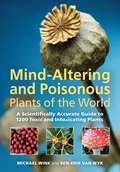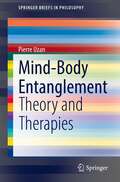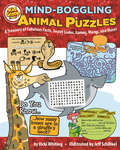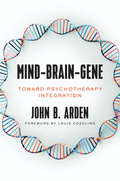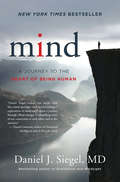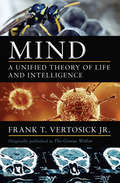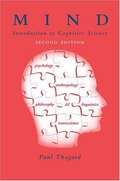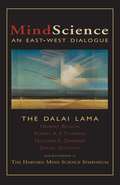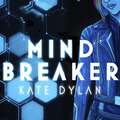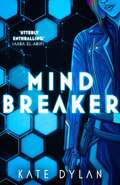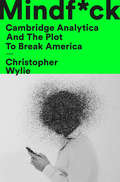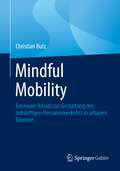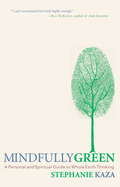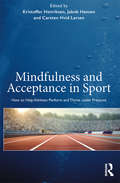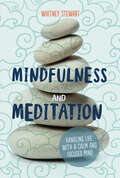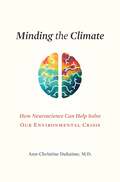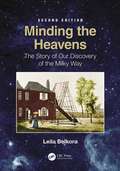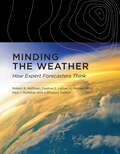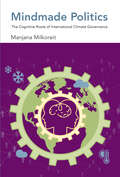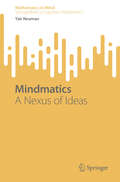- Table View
- List View
Mind, Brain, Quantum AI, and the Multiverse
by Andreas WichertMind, Brain, Quantum AI, and the Multiverse There is a long-lasting controversy concerning our mind and consciousness.This book proposes a connection between the mind, the brain, and the multiverse. The author introduces the main philosophical ideas concerning mind and freedom, and explains the basic principles of computer science, artificial intelligence of brain research, quantum physics, and quantum artificial intelligence. He indicates how we can provide an answer to the problem of the mind and consciousness by describing the nature of the physical world. His proposed explanation includes the Everett Many-Worlds theory. Mind, Brain, Quantum AI, and the Multiverse tries to avoid any non-essential metaphysical speculations. The book is an essential compilation of knowledge in philosophy, computer science, biology, and quantum physics. It is written for readers without any requirements in mathematics, physics, or computer science.
Mind, Life, and Universe
by Lynn Margulis Eduardo PunsetNearly 40 of the world's most esteemed scientists discuss the big questions that drive their illustrious careers. Frank and often irreverent, the men and women assembled here reveal a hidden world of intellectual interests, verve, and humor.
Mind, Mood, and Memory: The Neurobehavioral Consequences of Multiple Sclerosis
by Anthony FeinsteinA unique resource for all health care practitioners caring for people with multiple sclerosis.Endorsed by The Consortium of Multiple Sclerosis CentersMultiple sclerosis (MS), a progressive neurologic disease, is characterized by a host of physical symptoms. But the neurobehavioral consequences of MS can be as devastating and debilitating as physical symptoms, and they are often unreported and undertreated. In this new book, Dr. Anthony Feinstein, a neuropsychiatrist, documents the effects of MS on cognition, information processing speed, learning and memory, executive function, personality, mood, and behavior.Feinstein touches on a number of topics, including• the common cognitive challenges that occur with MS, such as slowed information processing speed, impaired memory, and executive function deficits • psychiatric disorders that accompany MS, such as depression and psychosis• current neuropsychological, brain MRI, and treatment data applicable to the psychiatric and cognitive disordersMind, Mood, and Memory in Multiple Sclerosis is enhanced both by the latest science and by eloquent case histories that illustrate each cognitive and emotional disorder. Feinstein also provides recommendations for evidence-based therapeutic interventions. Written in an immediate, accessible way, this book has a crossover appeal, making it of interest not only to neurologists, psychiatrists, neuropsychiatrists, neuropsychologists, psychologists, occupational therapists, and nurses but also to people with MS and their caregivers, family, and friends.
Mind-Altering and Poisonous Plants of the World
by Michael Wink Ben-Erik van WykThe book is meant for gardeners, pharmacists, doctors or members of Poison Centres to identify and learn about more than 1200 poisonous and mind-altering plants and to be able to help in case of poisoning and intoxication.
Mind-Body Entanglement: Theory and Therapies (SpringerBriefs in Philosophy)
by Pierre UzanThis book suggests a radical departure in approaching the mind-body problem. Instead of trying to causally relate subjective experience to the functioning of the body, it begins with the notion of the psychosomatic unity of the individual and looks for its conditions of possibility. This text shows that what makes this unity possible is the generalized entanglement relation that connects a person's subjective experience with its body functioning in a specific way.In addition to providing a significant contribution to the long-standing philosophical debate about the nature of the mind-body connection, this change of perspective based on the concept of generalized entanglement allows for exploring a holistic approach to health. It can for example explain the existence of body memory and leads to a better understanding of the genesis and evolution of internal diseases, allowing for the development of mind-body therapies. This volume also provides new insights into mental disorders and sets the theoretical basis of self-healing methods appealing to students, researchers and professionals in the fields.
Mind-Boggling Animal Puzzles: A Treasury of Fabulous Facts, Secret Codes, Games, Mazes, and More! (Kid Scoop)
by Vicki WhitingA brain-busting activity book that lets kids learn about animals from kangaroos and polar bears to tarantulas and snakes—all while having loads of fun! With crazy cool codes, puzzles, word searches, and so much more, these entertaining activities align with STEM curricula to keep kids engaged as they learn. Author and former teacher Vicki Whiting is the founder of Kid Scoop, an award-winning weekly activity page that promotes standards-based learning. Parents and teachers around the world use Vicki&’s fun activities to stimulate academic success and a joy of learning. With this expansive collection of exercises, kids aged 5-10 will spend hours learning loads of fun facts all about animals as they complete hundreds of exciting activities. This is a fixed-format ebook, which preserves the design and layout of the original print book
Mind-Brain-Gene: Toward Psychotherapy Integration
by John ArdenAn exploration of the ways the immune system, epigenetics, affect regulation, and attachment intersect in mental health. The evolution of psychotherapy in the 21st Century demands integration. Instead of choosing from the blizzard of modalities and schools of the past, therapists must move toward finding common denominators among them. Similarly, today’s psychotherapy necessitates the integration of the mind and body, not the past practice of compartmentalization of mental health and physical health. This book contributes to the sea change in how we conceptualize mental health problems and their solutions. Mind-Brain-Gene describes the feedback loops between the multiple systems contributing to the emergence of the mind and the experience of the self. It explains how our mental operating networks “self”-organize, drawing from and modifying our memory systems to establish and maintain mental health. Synthesizing research in psychoneuroimmunology and epigenetics with interpersonal neurobiology and research on integrated psychotherapeutic approaches, John Arden explores how insecure attachment, deprivation, child abuse, and trauma contribute to anxiety disorders and depression to produce epigenetic affects. To help people suffering from anxiety and depression, it is necessary to make sense of the multidirectional feedback loops between the stress systems and the dysregulation of the immune system that lead to those conditions. Successful psychotherapy modifies the feedback loops among the self-maintenance systems. Through the orchestration of the mental operating networks, psychotherapy promotes the re-regulation of immune system functions, stress systems, nutrition, microbiome (gut bacteria), sleep, physical inactivity, affect regulation, and cognition. This book makes a strong case for healthcare and psychotherapy to be combined—together they can revolutionize the way we conceive of, and attain, optimal health in the 21st Century.
Mind: A Journey to the Heart of Being Human
by Daniel J. SiegelA scientist's exploration into the mysteries of the human mind. What is the mind? What is the experience of the self truly made of? How does the mind differ from the brain? Though the mind's contents--its emotions, thoughts, and memories--are often described, the essence of mind is rarely, if ever, defined. In this book, noted neuropsychiatrist and New York Times best-selling author Daniel J. Siegel, MD, uses his characteristic sensitivity and interdisciplinary background to offer a definition of the mind that illuminates the how, what, when, where, and even why of who we are, of what the mind is, and what the mind's self has the potential to become. MIND takes the reader on a deep personal and scientific journey into consciousness, subjective experience, and information processing, uncovering the mind's self-organizational properties that emerge from both the body and the relationships we have with one another, and with the world around us. While making a wide range of sciences accessible and exciting--from neurobiology to quantum physics, anthropology to psychology--this book offers an experience that addresses some of our most pressing personal and global questions about identity, connection, and the cultivation of well-being in our lives.
Mind: A Unified Theory of Life and Intelligence
by Frank T. Vertosick Jr.In this &“engaging&” book, a noted neurosurgeon explores the possibility of intelligence in bacteria and other microorganisms (Library Journal). It has a goal and a strategy to achieve it. It disguises itself as it stealthily surveys its enemy&’s vulnerabilities. It mobilizes its resources to conquer. It bides its time until it is certain it can overwhelm its victim. Then it attacks. If it detects resistance it changes tactics–retreats, sends for reinforcements, captures its enemy&’s intelligence and incorporates it. It regroups and, transformed, goes forth again to triumph. This could be a description of a human army. It happens, however, to be a description of an army of cancer cells. Most of us shrink from describing bacteria and other microorganisms as intelligent. Neurosurgeon Frank Vertosick does not. And perhaps, when you finish reading MIND: A UNIFIED THEORY OF LIFE AND INTELLIGENCE, you will not either. What is intelligence? We define it in human terms, but are humans the only measure? We ascribe it to higher mammals and to social insects like bees and ants, but when we cross the threshold into cellular life, definitions blur. This revolutionary–but accessible and highly entertaining–exploration of intelligence is guaranteed to alter your appreciation of life on its most fundamental level. Frank T. Vertosick, J.R., M.D. is the author of WHEN AIR HITS YOUR BRAIN and WHY WE HURT: THE NATURAL HISTORY OF PAIN (Originally published as THE GENIUS WITHIN)
Mind: A Unified Theory of Life and Intelligence
by Frank T. Vertosick Jr.In this &“engaging&” book, a noted neurosurgeon explores the possibility of intelligence in bacteria and other microorganisms (Library Journal). It has a goal and a strategy to achieve it. It disguises itself as it stealthily surveys its enemy&’s vulnerabilities. It mobilizes its resources to conquer. It bides its time until it is certain it can overwhelm its victim. Then it attacks. If it detects resistance it changes tactics–retreats, sends for reinforcements, captures its enemy&’s intelligence and incorporates it. It regroups and, transformed, goes forth again to triumph. This could be a description of a human army. It happens, however, to be a description of an army of cancer cells. Most of us shrink from describing bacteria and other microorganisms as intelligent. Neurosurgeon Frank Vertosick does not. And perhaps, when you finish reading MIND: A UNIFIED THEORY OF LIFE AND INTELLIGENCE, you will not either. What is intelligence? We define it in human terms, but are humans the only measure? We ascribe it to higher mammals and to social insects like bees and ants, but when we cross the threshold into cellular life, definitions blur. This revolutionary–but accessible and highly entertaining–exploration of intelligence is guaranteed to alter your appreciation of life on its most fundamental level. Frank T. Vertosick, J.R., M.D. is the author of WHEN AIR HITS YOUR BRAIN and WHY WE HURT: THE NATURAL HISTORY OF PAIN (Originally published as THE GENIUS WITHIN)
Mind: Introduction to Cognitive Science (2nd edition)
by Paul ThagardCognitive science approaches the study of mind and intelligence from an interdisciplinary perspective, working at the intersection of philosophy, psychology, artificial intelligence, neuroscience, linguistics, and anthropology. With Mind, Paul Thagard offers an introduction to this interdisciplinary field for readers who come to the subject with very different backgrounds. It is suitable for classroom use by students with interests ranging from computer science and engineering to psychology and philosophy. Thagard's systematic descriptions and evaluations of the main theories of mental representation advanced by cognitive scientists allow students to see that there are many complementary approaches to the investigation of mind. The fundamental theoretical perspectives he describes include logic, rules, concepts, analogies, images, and connections (artificial neural networks). The discussion of these theories provides an integrated view of the different achievements of the various fields of cognitive science. This second edition includes substantial revision and new material. Part I, which presents the different theoretical approaches, has been updated in light of recent work the field. Part II, which treats extensions to cognitive science, has been thoroughly revised, with new chapters added on brains, emotions, and consciousness. Other additions include a list of relevant Web sites at the end of each chapter and a glossary at the end of the book. As in the first edition, each chapter concludes with a summary and suggestions for further reading.
MindScience
by Daniel Goleman Herbert Benson Robert Thurman His Holiness the Dalai Lama Howard GardnerWhat is the subtle relationship between mind and body? What can today's scientists learn about this relationship from masters of Buddhist thought? Is it possible that by combining Western and Eastern approaches, we can reach a new understanding of the nature of the mind, the human potential for growth, the possibilities for mental and physical health? MindScience explores these and other questions as it documents the beginning of a historic dialogue between modern science and Buddhism. The Harvard Mind Science Symposium brought together the Dalai Lama and authorities from the fields of psychiatry, psychology, neuroscience, and education. Here, they examine myriad questions concerning the nature of the mind and its relationship to the body.
Mindbreaker
by Kate DylanSet in the same world as the extraordinary Mindwalker, Mindbreaker is an action packed young adult science fiction novel asking: what would you sacrifice to survive?They saved her life. But at what cost?Born into a religious, anti-tech cult, seventeen-year-old Indra lives a simple, mod-free existence on the fringe of society. But when an illicit trip to the city leaves her with a debilitating - and terminal - condition, Indra must make a choice: die faithful, or betray her Order and accept the cure Glindell Technologies is offering. Forced to sign over full ownership of her life, Indra is horrified to learn how Glindell chose to save her mind and body. On the outside, she still looks the same. On the inside, Indra's not so sure. She's missing time, for one thing, and more than once, she finds herself in places she really shouldn't be, with no memory of how she got there and abilities she can't explain.So when news breaks of a vicious attack against Glindell's biggest rival, Indra begins to suspect the worst about her new master. With help from her one friend at the company, Tian - a research assistant with a genius IQ and a smile that won't quit - Indra manages to escape the lab. Then together with the anti-corp faction she and Tian turn to for help, Indra must uncover the truth behind the procedure that saved her life, before Glindell can use it to change the face of technology - and what it means to be human - forever.(P) 2023 Hodder & Stoughton Limited
Mindbreaker
by Kate DylanNo more quiet rebellions.'A dystopian thriller that fizzes with energy and rebellion' SAMANTHA SHANNONAn explosive cyberpunk SF thriller from the author of Mindwalker, set in a world of corporate intrigue and dangerous technology. Born into a religious cult on the fringe of society, Indra Dyer lives a simple, tech-free existence. But when an illicit trip to the city leaves her with a debilitating - and terminal - condition, Indra must make a choice: die faithful or betray her Order and accept the cure Glindell Technologies is offering. Forced to sign over full ownership of her life, Indra is horrified to learn the true nature of Glindell's plans. Instead of saving her body, they upload her mind to a first-of-its-kind MindDrive, housed in a fully robotic shell. On the outside, Indra still looks the same; on the inside, she's not so sure. She keeps finding herself in places she really shouldn't be, with no memory of how she got there, and dangerous abilities she can't explain. So when news breaks of an attack against Glindell's biggest rival, Indra suspects the worst. With the help of Tian - a research assistant with questionable morals and a smile that won't quit - Indra must uncover the truth behind the procedure that saved her life, before Glindell can use it to change the face of technology, and what it means to be human, forever . . .PRAISE FOR KATE DYLAN'Witty, gritty, and vicious fun' HANNAH KANER'An invigorating ride at breakneck speed . . . Electric' SAARA EL-ARIFI'The thrill ride of a lifetime' KAT DUNN'Pure adrenaline shot straight into your veins' JESSE Q. SUTANTO'Sharp-edged, tense and thrilling, you'll be holding your breath until the last page' TASHA SURI
Mindbreaker
by Kate DylanNo more quiet rebellions.'A dystopian thriller that fizzes with energy and rebellion' SAMANTHA SHANNONAn explosive cyberpunk SF thriller from the author of Mindwalker, set in a world of corporate intrigue and dangerous technology. Born into a religious cult on the fringe of society, Indra Dyer lives a simple, tech-free existence. But when an illicit trip to the city leaves her with a debilitating - and terminal - condition, Indra must make a choice: die faithful or betray her Order and accept the cure Glindell Technologies is offering. Forced to sign over full ownership of her life, Indra is horrified to learn the true nature of Glindell's plans. Instead of saving her body, they upload her mind to a first-of-its-kind MindDrive, housed in a fully robotic shell. On the outside, Indra still looks the same; on the inside, she's not so sure. She keeps finding herself in places she really shouldn't be, with no memory of how she got there, and dangerous abilities she can't explain. So when news breaks of an attack against Glindell's biggest rival, Indra suspects the worst. With the help of Tian - a research assistant with questionable morals and a smile that won't quit - Indra must uncover the truth behind the procedure that saved her life, before Glindell can use it to change the face of technology, and what it means to be human, forever . . .PRAISE FOR KATE DYLAN'Witty, gritty, and vicious fun' HANNAH KANER'An invigorating ride at breakneck speed . . . Electric' SAARA EL-ARIFI'The thrill ride of a lifetime' KAT DUNN'Pure adrenaline shot straight into your veins' JESSE Q. SUTANTO'Sharp-edged, tense and thrilling, you'll be holding your breath until the last page' TASHA SURI
Mindf*ck: Cambridge Analytica and the Plot to Break America
by Christopher WylieFor the first time, the Cambridge Analytica whistleblower tells the inside story of the data mining and psychological manipulation behind the election of Donald Trump and the Brexit referendum, connecting Facebook, WikiLeaks, Russian intelligence, and international hackers. <P><P>Mindf*ck goes deep inside Cambridge Analytica’s “American operations,” which were driven by Steve Bannon’s vision to remake America and fueled by mysterious billionaire Robert Mercer’s money, as it weaponized and wielded the massive store of data it had harvested on individuals—in excess of 87 million—to disunite the United States and set Americans against each other. Bannon had long sensed that deep within America’s soul lurked an explosive tension. <P><P>Cambridge Analytica had the data to prove it, and in 2016 Bannon had a presidential campaign to use as his proving ground. Christopher Wylie might have seemed an unlikely figure to be at the center of such an operation. Canadian and liberal in his politics, he was only twenty-four when he got a job with a London firm that worked with the U.K. Ministry of Defense and was charged putatively with helping to build a team of data scientists to create new tools to identify and combat radical extremism online. In short order, those same military tools were turned to political purposes, and Cambridge Analytica was born. <P><P>Wylie’s decision to become a whistleblower prompted the largest data-crime investigation in history. His story is both exposé and dire warning about a sudden problem born of very new and powerful capabilities. It has not only laid bare the profound vulnerabilities—and profound carelessness—in the enormous companies that drive the attention economy, it has also exposed the profound vulnerabilities of democracy itself. What happened in 2016 was just a trial run. Ruthless actors are coming for your data, and they want to control what you think.
Mindful Mobility: Ein neuer Ansatz zur Gestaltung des zukünftigen Personenverkehrs in urbanen Räumen
by Christian ButzDie aktuelle Entwicklung der Mobilität in urbanen Räumen stellt alle Beteiligten vor große Herausforderungen. Zunehmende Versorgungströme und der Wunsch nach individueller Mobilität bringen die Verkehrsinfrastruktur an ihre Grenzen. Nachteilige Folgen sind Staus, Luft- und Lärmbelastung sowie zunehmend Schäden an Verkehrsflächen, deren Erhaltung enorme Kosten verursacht und im täglichen Betrieb des urbanen Lebens einen hohen Aufwand und vielfältige Einschränkungen bedeuten. Gesellschaft, Politik und Unternehmen sind gefordert, geeignete Lösungen zu entwickeln und umzusetzen. Dabei müssen ökologische, ökonomische und soziale Themen mit dem Ziel einer Mindful Mobility ausgewogen berücksichtigt werden.Dieses Buch zeigt anhand eines Reifegradmodells nachhaltige Konzepte, Beispiele und schrittweise Lösungen für den urbanen Raum und die Mobilität.
Mindfully Green: A Personal and Spiritual Guide to Whole Earth Thinking
by Stephanie KazaWith all the attention on living sustainably, the one thing missing from the conversation is how to find a personal connection with green living that will sustain us on our green path. While practical approaches to an eco-responsible lifestyle offer important first steps, it is critical that we ground these actions in broader understanding so that we can effect real change in the world. In this book, Stephanie Kaza describes what she calls the "green practice path." She offers a simple, Buddhist-inspired philosophy for taking up environmental action in real, practical, and effective ways. Discover new ways to think more deeply about your impact on the natural world, engage in environmental change, and make green living a personal practice based in compassion and true conviction.
Mindfulness and Acceptance in Sport: How to Help Athletes Perform and Thrive under Pressure
by Kristoffer Henriksen Jakob Hansen Carsten Hvid LarsenMindfulness- and acceptance-based approaches such as Acceptance and Commitment Therapy (ACT) and Mindfulness Acceptance Commitment (MAC) are gaining momentum with sport psychology practitioners who work to support elite athletes. These acceptance-based, or third wave, cognitive behavioral approaches in sport psychology highlight that thought suppression and control techniques can trigger a metacognitive scanning process, and that excessive cognitive activity and task-irrelevant focus (self-focused attention such as trying to change thoughts) disrupts performance. Using this perspective, the aim of sport psychology interventions is not to help the athletes engage in the futile task of managing and controlling internal life. Rather, it suggests that sport psychology practitioners should work to increase athletes’ willingness to accept negative thoughts and emotions in pursuit of valued ends. Key aspects of such interventions include: teaching athletes to open up and accept, teaching athletes to mindfully engage in the present moment, and helping athletes formulate the values and engage in committed actions towards these values. The goal of Mindfulness and Acceptance in Sport: How to Help Athletes Perform and Thrive under Pressure then is to provide students, researchers, practitioners, and coaches of sport psychology with practical guidance for implementing mindfulness and acceptance approaches in their work with athletes. This book brings together highly experienced practitioners and shares their working methods, exercises, and cases to inspire the sport psychology profession.
Mindfulness and Meditation: Handling Life with a Calm and Focused Mind
by Whitney StewartFrom hormones to homework, parents to peers, health issues to bad habits, life can be a pressure cooker. How can we find relief? Author Whitney Stewart introduces readers to the practice of mindfulness. With its roots in ancient Buddhist teachings, mindfulness—the practice of purposefully focusing attention on the present moment—can change a person's approach to stress, develop skills to handle anxiety and depression, and provide a sense of awareness and belonging. Stewart guides readers through how to get started with meditation as well as provides specific exercises for examining emotions, managing stress, checking social media habits and wellness routines, and setting intentions to increase happiness. "A thorough and accessible resource for young people."—Kirkus Reviews "Considering the range of challenges that today's teens face, equipping them with pertinent coping skills is crucial for their future success and well-being. . . . [S]traightforward and refreshing."—School Library Journal
Minding the Climate: How Neuroscience Can Help Solve Our Environmental Crisis
by Ann-Christine DuhaimeA neurosurgeon explores how our tendency to prioritize short-term consumer pleasures spurs climate change, but also how the brain’s amazing capacity for flexibility can—and likely will—enable us to prioritize the long-term survival of humanity.Increasingly politicians, activists, media figures, and the public at large agree that climate change is an urgent problem. Yet that sense of urgency rarely translates into serious remedies. If we believe the climate crisis is real, why is it so difficult to change our behavior and our consumer tendencies?Minding the Climate investigates this problem in the neuroscience of decision-making. In particular, Ann-Christine Duhaime, MD, points to the evolution of the human brain during eons of resource scarcity. Understandably, the brain adapted to prioritize short-term survival over more uncertain long-term outcomes. But the resulting behavioral architecture is poorly suited to the present, when scarcity is a lesser concern and slow-moving, novel challenges like environmental issues present the greatest danger. Duhaime details how even our acknowledged best interests are thwarted by the brain’s reward system: if a behavior isn’t perceived as immediately beneficial, we probably won’t do it—never mind that we “know” we should. This is what happens when we lament climate change while indulging the short-term consumer satisfactions that ensure the disaster will continue.Luckily, we can sway our brains, and those of others, to alter our behaviors. Duhaime describes concrete, achievable interventions that have been shown to encourage our neurological circuits to embrace new rewards. Such small, incremental steps that individuals take, whether in their roles as consumers, in the workplace, or in leadership positions, are necessary to mitigate climate change. The more we understand how our tendencies can be overridden by our brain’s capacity to adapt, Duhaime argues, the more likely we are to have a future.
Minding the Heavens: The Story of our Discovery of the Milky Way
by Leila BelkoraToday, we recognize that we live on a planet circling the sun, that our sun is just one of billions of stars in the galaxy we call the Milky Way, and that our galaxy is but one of billions born out of the Big Bang. Yet as recently as the early twentieth century, the general public and even astronomers had vague and confused notions about what lay beyond the visible stars. Can we see to the edge of the universe? Do we live in a system that would look, from a distance, like a spiral nebula? This fully updated second edition of Minding the Heavens: The Story of Our Discovery of the Milky Way explores how we learned that we live in a galaxy, in a universe of composed of galaxies and unseen, mysterious dark matter. The story unfolds through short biographies of seven astronomers: Thomas Wright, William Herschel, and Wilhelm Struve of the 18th and 19th centuries; the transitional figure of William Huggins; and Jacobus Kapteyn, Harlow Shapley, and Edwin Hubble of the modern, big-telescope era. Each contributed key insights to our present understanding of where we live in the cosmos, and each was directly inspired by the work of his predecessors to decipher "the construction of the heavens." Along the way the narrative weaves in the contributions of those in supportive roles, including Caroline Herschel—William’s sister, and the first woman paid to do astronomy—and Martha Shapley, a mathematician in her own right who carried out calculations for her spouse. Through this historical perspective readers will gain a new appreciation of our magnificent Milky Way galaxy and of the beauties of the night sky, from ghostly nebulae to sparkling star clusters. Features: Fully updated throughout to reflect the latest in our understanding of the Milky Way, from our central supermassive black hole to the prospect of future mergers with other galaxies in our Local Group. Explains the significance of current research, including from the Gaia mission mapping our galaxy in unprecedented detail Unique and broadly appealing approach. A biographical framework and ample illustrations lead the reader by easy, enjoyable steps to a well-rounded understanding of the history of astronomy. Praise for the first edition— "A terrific blend of the science and the history." - Marth Haynes, Goldwin Smith Professor of Astronomy, Cornell University "The book is a treat… Highly recommended for public and academic libraries." -Peter Hepburn (now Head Librarian, College of the Canyons, Santa Clarita, California)
Minding the Weather: How Expert Forecasters Think (The\mit Press Ser.)
by H. Michael Mogil Robert R. Hoffman Daphne S. Ladue Paul J. Roebber J. Gregory TraftonA detailed study of research on the psychology of expertise in weather forecasting, drawing on findings in cognitive science, meteorology, and computer science.This book argues that the human cognition system is the least understood, yet probably most important, component of forecasting accuracy. Minding the Weather investigates how people acquire massive and highly organized knowledge and develop the reasoning skills and strategies that enable them to achieve the highest levels of performance.The authors consider such topics as the forecasting workplace; atmospheric scientists' descriptions of their reasoning strategies; the nature of expertise; forecaster knowledge, perceptual skills, and reasoning; and expert systems designed to imitate forecaster reasoning. Drawing on research in cognitive science, meteorology, and computer science, the authors argue that forecasting involves an interdependence of humans and technologies. Human expertise will always be necessary.
Mindmade Politics: The Cognitive Roots of International Climate Governance (The\mit Press Ser.)
by Manjana MilkoreitHow integrating cognitive theories and international relations scholarship can yield valuable insights into the effectiveness of climate negotiations.Mindmade Politics takes a novel, interdisciplinary approach to understanding the complex and contentious dynamics of global climate politics. Manjana Milkoreit argues that integrating cognitive theories and international relations scholarship can yield valuable insights into multilateral cooperation (or the lack of it) on climate change and the process of negotiating climate agreements. Milkoreit argues that cognition is at the root of all political behavior and decision making. Some of the most important variables of international relations scholarship—the motivations of political actors—are essentially cognitive variables. Drawing on interviews with participants in the United Nations Framework Convention on Climate Change (UNFCCC), Milkoreit examines the thoughts, beliefs, and emotions of individuals and groups, focusing on the mental mechanisms connecting decision-relevant factors and observed political behavior. Milkoreit offers a brief introduction to international relations theory and key insights regarding the politics of climate change; outlines the basic cognitive theories and concepts that she applies in her analysis, discussing the cognitive challenges of climate change; and describes the integrated methodological approach she used for her cognitive-political analysis. She presents four cognitive-affective lessons for global change politics, including the “cognitive triangle” of three major concerns of climate negotiators—threat, identity, and justice—and she identifies six major belief systems driving negotiators. Finally, she offers guidance for climate governance based on her findings. Utilizing recent advances in cognitive science, Milkoreit builds a theoretical bridge between two major disciplines that will benefit both scholars and practitioners.
Mindmatics: A Nexus of Ideas (Mathematics in Mind)
by Yair NeumanMindmatics invites readers into a captivating exploration where the boundaries between mind and mathematics dissolve. Professor Neuman delves into the profound connections between cognitive processes and mathematical expression in this groundbreaking work. From how children grasp abstract concepts to symmetry's role in art and mathematics, this book uncovers the hidden structures that shape our understanding of the world. With insightful discussions on the relationship between poetry and mathematics and the essential role of the unconscious in fostering mathematical imagination, Mindmatics offers a unique perspective on the interplay of thought, creativity, and logic. This book is a must-read for anyone curious about the deeper links between the human mind and the mathematical universe.
